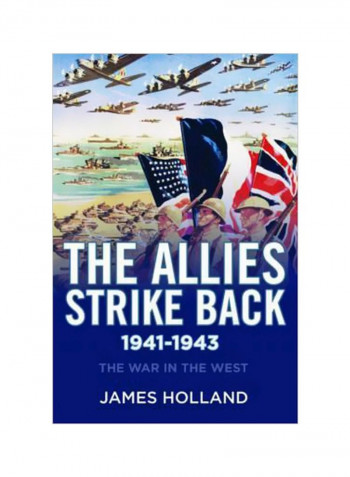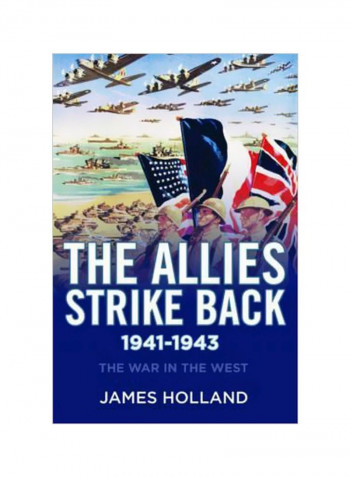The Allies Strike Back, 1941-1943 Hardcover
Recommend
Sort by
Rating
Date
Specifications
Author 1
James Holland
Book Description
By June 1941, Germany's war machine looked to be unstoppable. The Nazi blitzkrieg had taken Poland, France, and Holland with shocking speed. The Luftwaffe had bombed London, while German U-boats wrought havoc on Allied shipping on the Atlantic. And yet, as James Holland shows at the start of The Allies Strike Back, 1941-1943--the second volume in his magisterial narrative of World War II in the West--cracks were already appearing in Germany's apparent invincibility. Shortages of food and materiel were becoming critical. And, having failed to defeat Britain, Adolf Hitler fatefully pivoted east to invade the Soviet Union--territory he felt compelled to conquer for Germany's protection--and on June 22, 1941 precipitated the largest clash of arms the world had ever seen. Built for speed and quick conquest, German forces by that fall were bogged down in a horrible war of attrition that blunted the Nazi momentum. The Allies Strike Back offers fascinating new perspective on the critical middle years in World War II's western theatre, as the advantage between Axis and Allied forces swung back and forth on the Atlantic and eastern front, and in north Africa and Europe. Acclaimed historian James Holland has spent years conducting original research and interviews, mining newly available archives, visiting battlefields and uncovering letters and diaries previously unread. Acknowledging that strategy and tactics have been the focus of previous histories, he gives equal space to the logistics and supply of men and materiel without which no war can be fought. Allied and Axis leaders criss-cross Holland's narrative, but he also memorably introduces readers to heretofore unknown participants: Sgt. Ralph Schaps, who experienced the Louisiana Maneuvers that propelled him into Europe; Colonel Hermann Balck, in command of a German panzer regiment in Africa; U-boat captain Teddy Suhren, operating against Allied shipping in the Atlantic; Billy Drake, squadron commander in Britain's Desert Air Force that helped turn the tide in North Africa; and many others. Following the acclaimed first volume of his trilogy, The Rise of Germany, and offering frank assessments of successes and failures on both sides, James Holland has crafted a masterful and gripping narrative of the events that ultimately determined the outcome of World War II.
ISBN-13
9780802125606
Language
English
Publisher
Atlantic Monthly Press
Publication Date
3/Oct/17
Number of Pages
720
About the Author
James Holland is a historian, writer, and broadcaster. The author of The Rise of Germany, 1939-1941, the first book in The War in the West series, as well as the bestselling Fortress Malta, Battle of Britain, and Dam Busters, he has also written numerous works of historical fiction. Holland regularly appears on television and radio and has written and presented the BAFTA-shortlisted documentaries Battle of Britain and Dam Busters for the BBC, among others. His writing has appeared in magazines and newspapers including the Sunday Telegraph, for whom he went to Helmand Province in Afghanistan, the Times, Daily Mail, and BBC History Magazine. A fellow of the Royal Historical Society, and cofounder and program director of the hugely successful Chalke Valley History Festival, Holland has also advised the British government on history curriculum and has his own collection at the Imperial War Museum.
Editorial Review
Praise for The Allies Strike Back, 1941-1943: The War in the West, Volume 2 A Military History Book Club Main Selection An Amazon Best Book of the Month (History) "As someone who considers himself well-read in World War II history, this reviewer was pleasantly surprised to discover how much he did not know, and, moreover, how much of what he thought he knew was simply not true. The second volume in Holland's trilogy is even better than his first . . . A fascinating story of how the fortunes of war changed in obvious--and particularly not so obvious--ways."--Col. Eric M. Walters, Military Review "Detailed, well-researched, and comprehensive . . . Holland makes a strong case . . . [He] shifts smoothly between high-level strategy and tactical battlefield events, producing a good refresher to the large strategic picture for those who are deeply read in WWII history and an excellent introduction to the war in Western Europe for the general reader."--Publishers Weekly "An illuminating read from a skilled historian . . . Holland delivers a detailed, opinionated account of fighting in North Africa, the Atlantic submarine campaign, and the air war while acknowledging (and often describing) the far larger war in Russia . . . Expert, anecdote-filled, thoroughly entertaining."--Kirkus Reviews "Holland puts the case for Allied technological and military skills as a vital factor in turning the war's tide, and makes us eager for the third and final part of what now ranks as a towering work of historical research and writing."--BBC History Magazine "A well-researched, lively account."--CHOICE "Holland's two greatest qualities, his engaging writing style and his ability to weave multiple threads into a convincing whole, are on display once more in this accessible and authoritative history . . . Holland, a successful fiction author as well, keeps his reader gripped with an engrossing tale, which both educates and entertains. In Holland's own words this is 'a truly epic and astonishing story' and the same could be said for his book."--History of War (UK) "Holland shoots down the myth of German invincibility . . . All the great turning points of 1941-43 are here. A triumph"--Sunday Express (UK) "Holland brings a fresh eye to the ebb and flow of the conflict . . . [A] majestic saga"--Literary Review (UK) "This second volume easily reaches the benchmark set by its predecessor . . . The style is crisp, engaging, absorbing, it really does have the feel of a fresh and revisionist perspective on the momentous events that occurred between 1941 and 1943."--Soldier (UK) Praise for The Rise of Germany, 1939-1941: The War in the West, Volume 1 A Military History Book Club Main Selection "This is narrative history as intimate, intricate tapestry . . . Mr. Holland's success is built in part on an engaging writing style and in part on a genuinely fresh approach to events that have been so often--and apparently definitively--recounted. This is at heart an operational narrative, but with a difference: Mr. Holland takes the time and space to enhance his recounting of troop and ship movements and clashes of arms with the stuff of wider humanity. He deftly interweaves the experiences of refugees, of civilians, of the warriors' loved ones and of the political elites, while never distracting us with meaningless sentimentality or extraneous personal detail. This is harder to do than it looks. Mr. Holland's achievement is exceptional . . . [An] epic narrative."--Wall Street Journal "Impeccably researched and superbly written . . . [Holland] skewers a number of myths about the early years of the Second World War . . . Holland's fascinating saga offers a mixture of captivating new research and well-considered revisionism. The next two volumes should be unmissable."--Guardian "Fascinating."--Daily Mail (UK) "James Holland is the best of the new generation of World War II historians. His epic new venture convincingly challenges many received ideas about the war and draws some exciting new conclusions."--Sebastian Faulks "With this magnificent, hugely readable debut, James Holland's The War in the West is set fair to become one of the truly great multivolume histories of the Second World War."--Andrew Roberts, New York Times bestselling author of The Storm of War: A New History of the Second World War and Napoleon: A Life "This brilliant, lucid and intimate history is a game-changer, the Second World War will never seem the same again."--Professor David Edgerton, Hans Rausing Professor of the History of Science and Technology, King's College London "James Holland has produced a gripping multi-layered study of the War in West. It weaves together accounts from all levels of those caught up in the opening stages of the war and provides an accessible and captivating narrative. More importantly still it offers a challenging reappraisal that forces us to rethink our attitudes to the conduct of the most destructive and important war in history. Essential reading."--John Buckley, Professor of War Studies, Wolverhampton University and author of Monty's Men: The British Army and the Liberation of Europe "In The Rise of Germany, James Holland weds his typically deft writing to years of research and thought about the early years of World War II. He seeks--and finds--that elusive middle ground between the high politics of Hitler, Churchill, and Roosevelt and the personal experience of the soldier in the field. Holland writes on the operational level as well as any historian working today. I am already making room on my shelf for volumes two and three. I would read anything Holland writes."--Robert M. Citino, author of The German Way of War and The Wehrmacht Retreats "A hugely engaging, scholarly, and ambitious book that strips away the myths surrounding the Second World War and--uniquely--tells the human stories, not just the political and military history. A must-read for anyone with an interest in this turbulent and transformative period."--Tracy Borman, author of Thomas Cromwell "Holland's achievement here is presenting multiple perspectives based on extensive research in such a page-turner. This is as much a gripping drama played out on a huge stage with distinctive characters and rapidly unfolding action as it is a book on one of the most significant periods in all of world history."--Thomas Clavin, co-author of The Heart of Everything That Is "Holland nimbly weaves the complex military, diplomatic, political, economic, and social patterns that marked the conflict on a global scale . . . [He] keeps the reader engaged by showing the major events through the eyes of the participants--at the strategic level with politicians and generals, and at the tactical level with common soldiers and civilians . . . A worthy history that both general readers and WWII enthusiasts can enjoy."--Publishers Weekly "Holland skillfully integrates the broad political, diplomatic, economic, and military narrative with stories of individuals, civilians, and soldiers from all the belligerents."--Library Journal "A lively study."--Kirkus Reviews



